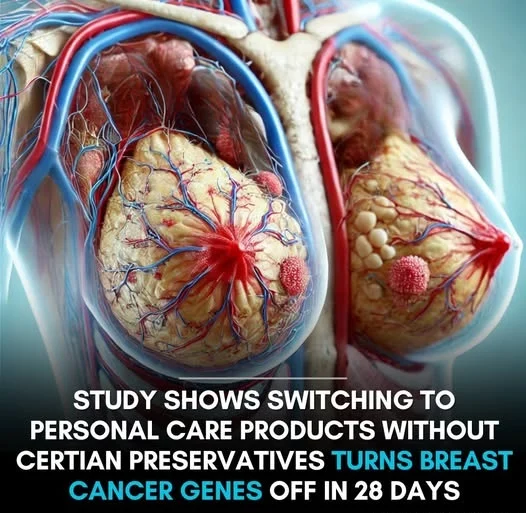In the modern world, cosmetics have become an essential product in personal beauty care. However, few are aware that these products may contain chemicals harmful to health, particularly increasing the risk of breast cancer. One of the most common substances found in these products is parabens and phthalates, two compounds often used to prolong the shelf life and fragrance of products. Recent studies have shown that these chemicals not only remain in the body for a long time but can also cause cellular changes that lead to breast cancer.
Parabens and phthalates act as xenoestrogens, which are synthetic compounds that can mimic estrogen in the body. When the body is exposed to too many xenoestrogens, it can alter natural biological processes, increasing the likelihood of developing breast cancer. Prolonged exposure to these substances can elevate the risk of breast cancer, especially when breast cells react to the excess estrogen.

An important study published in the journal Chemosphere in 2022 found that avoiding exposure to parabens and phthalates for 28 days can help minimize changes in cellular pathways related to cancer. According to a report by researchers from University of California, Berkeley, participants who stopped using products containing parabens and phthalates showed significant changes in pathways such as PI3K-AKT/mTOR, autophagy, and apoptotic signaling, all of which are critical factors related to cancer. This study shows that reducing exposure to these chemicals, even for a short time, can have a positive impact on breast cells and reduce cancer risk.
“We observed significant changes at the cellular level when participants stopped exposure to parabens and phthalates. These results suggest an effective prevention method for breast cancer,” the research team at University of California, Berkeley shared in the Chemosphere article (2022).
Another study from Harvard T.H. Chan School of Public Health, published in Environmental Health Perspectives in 2019, also pointed out that prolonged exposure to xenoestrogens in cosmetics can increase the risk of breast cancer. According to this study, women who used products containing parabens and phthalates had a higher likelihood of developing cellular abnormalities, particularly in breast cells.
“Our research clearly shows that exposure to xenoestrogens can lead to changes in biological mechanisms and increase the risk of breast cancer,” stated Harvard T.H. Chan School of Public Health in Environmental Health Perspectives (2019).
One simple but effective way to reduce this risk is to choose cosmetics that are free from parabens and phthalates. Experts recommend selecting beauty products made from natural ingredients and free from harmful chemicals, as this not only protects health but also reduces the risk of hormone-related cancers.
“Changing the habit of using cosmetics is an important step to protect your health from the harmful effects of chemicals,” advised the research team at American Cancer Society in the report Breast Cancer Prevention (2020).
In conclusion, choosing safe cosmetic products free from harmful chemicals such as parabens and phthalates is a simple yet effective way to protect health, particularly reducing the risk of breast cancer. Scientific research has proven that changing cosmetic habits can positively impact the body and minimize potential risks.


HPX24h > Health > Chemicals in Cosmetics That Could Increase Breast Cancer Risk – Did You Know?
Tagged Articles
Are ‘Forever Chemicals’ Present in Bandages? How This Could Affect Your Health
Chemicals in Tattoo Ink: Are They Linked to Blood and Skin Cancer?
Stem Cell Therapy for Lung Cancer: A New Hope Entering Human Trials
Top Reads from This Category
Health
5 Essential Things Every Woman Should Know About Menopause
Health
What Does a Right-Side Headache Indicate About Your Health?
Health
How Losing Just 5% of Your Weight Can Reduce the Risk of Diabetes
Health
Did You Know? Chronic Stress Can Prevent Your Body from Fully Recovering
Health
Step-by-Step Guide to Safely Relieving Bloating in Children
Health
What Is Epigastric Pain and What Causes It
Health
Heart and Brain Health: How to Effectively Prevent Cognitive Decline?
Discover New Topics
Science
Stem Cell Therapy for Lung Cancer: A New Hope Entering Human Trials
Science
New Artificial Kidney via Nanotechnology: A Revolutionary Alternative to Dialysis
Fitness
Effective Workout Tips: The Best Full-Body Exercises for Health
Parenting Tips
Talking to Children About Race: How to Make It Easier?
Health
The Link Between Daytime Sleep and Alzheimer’s Disease: What You Need to Know
Parenting Tips
Fun Facts for 3-Year-Olds: Exploring the World of Animals and New Foods
Healthy Eating
Ways to Reduce Sugar in Your Diet to Prevent Diabetes
Fitness
How Often Should You Work Out Each Week for Effective Weight Loss and Muscle Gain?
Space
Jupiter-Like Planets: The Key to Unlocking Earth-Like Worlds
Health
5 Tips to Help You Overcome Smartphone Addiction
Space
Tidal Heating: A New Challenge for Extraterrestrial Life
Healthy Eating
Types of Fats: Can Fats Be Good for You?
Science
A New Drug Could Treat Depression Within Just 24 Hours